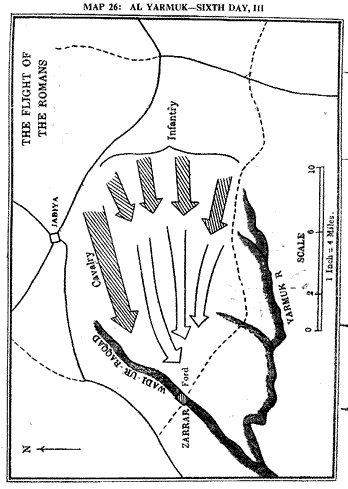|
The sun had
not yet reached its zenith when the Roman infantry was in full retreat-
part of it fleeing in panic and part withdrawing in good order.
It made for the Wadi-ur-Raqqad. After the retreating Romans came
the Muslim corps, now reformed into orderly lines with shorter fronts.
The Muslim cavalry moved to the north of the Roman army so that
none may escape in that direction, though before this escape route
could be fully sealed, thousands of Slavs and Armenians did manage
to get away. In this manner the Muslims closed in on the already
defeated Army of Caesar. 1
As the Romans fled the field of battle,
their only desire was to put as much distance as possible between
themselves and the Muslims. They knew that the northern escape route
was closed by the Muslim cavalry; but another channel of escape
was available where the Raqqad was crossed, at a ford, by a good
road. Towards this ford the officers guided their men. As the leading
regiment arrived at the ford, it rushed down the eastern slope of
the ravine and began to cross the stream. The eastern slope was
not so bad here as in other parts of the ravine; but the western
slope was much steeper, and near the top it became precipitous on
either side of the road, creating a bottleneck where a few brave
men could hold up an army.
Overjoyed at their escape from the Plain
of Yarmuk, the men in the lead laboured up the road on the western
bank of the ravine. It was only when they got near the top that
they noticed a group of Muslims standing above them with drawn swords.
At their head stood a lean, young warrior, naked above the waist!
During the night Khalid had sent Dhiraar
with 500 horsemen from the Mobile Guard to make a wide detour of
the Roman left, get behind the Wadi-ur-Raqqad, and occupy a blocking
position on the far bank of the ravine. Dhiraar, guided by a Christian
Arab named Abu Jueid, 2 had carried out
the move with admirable efficiency. Unknown to the Romans-who had
considered the crossing of the Raqqad too far back to be of tactical
significance - he had secured the western bank of the ravine and
concealed his men near the ford. Now Dhiraar stood with his men
on top of the western bank, looking down at the tired, panting Romans
(See Map 26 below)

Soon a volley of stones hit the Romans.
A few of them managed to get to the top, but were cut down instantly,
Finding themselves under a hail of stones, the leading elements
fell back on those behind them, these on those behind them, and
these again on those behind them. As Dhiraar charged at the Romans,
they went sliding down-a screaming, twisting, rolling avalanche-to
the bottom of the ravine.
The Romans still on the eastern bank stopped
when they saw the horror that had befallen the leading regiment.
It was clear that this escape route was also closed. Nothing could
be done to dislodge Dhiraar because of the narrowness of the crossing
which allowed no room for manoeuvre; so the Roman army turned to
defend itself against the impending attack from the east. The generals
who still remained with the army hastily deployed the regiments
for defence with their backs to the Wadi-ur-Raqqad and their right
flank resting on the Yarmuk River. They were caught between two
calamities-the ravine and the Muslims-and could not decide which
was worse!
1. The statement made by some later Western
writers that the Roman defeat was due to Khalid's exploitation of
a violent sand storm which blew in the faces of the Romans is utterly
incorrect. No Muslim historian has mentioned such a storm. Gibbon
(Vol. 5, p. 327) states that there was "a cloud of dust and adverse
wind", but only a child would imagine that the Muslim army, which
still numbered about 30,000 fit soldiers, deployed on an 11 mile front,
could be thrown into action so quickly, in such a superbly conceived
manoeuvre, merely to exploit a dust storm. And this in the days when
communication was by horse-rider! This is nothing but a proud Western
historian's attempt by to find an excuse for the Roman defeat.
2. Waqidi: p. 152.
|
